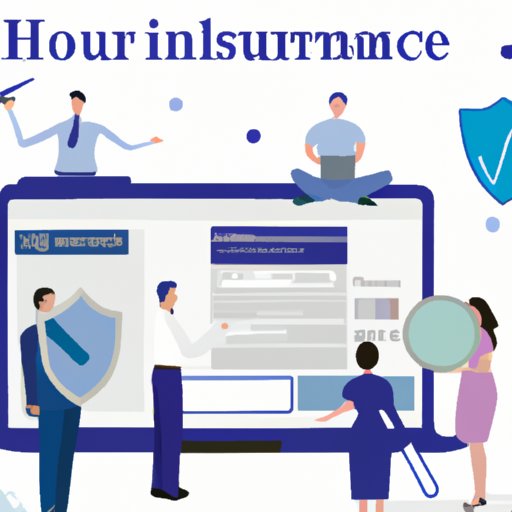Introduction
Health insurance is an important part of having access to quality healthcare. It helps to cover the cost of medical care and can protect you from financial hardship due to unexpected illness or injury. But what do you do if you don’t have a job? How can you still get the health insurance you need? In this article, we will explore the different options for buying health insurance without a job.
Research Government-run Health Insurance Programs
The first step in finding health insurance without a job is to research government-run health insurance programs. These programs are designed to provide affordable health insurance to those who cannot afford it on their own. Eligibility requirements vary by program, but generally speaking, they are open to those who are unemployed, low-income, or disabled.
Types of coverage available through government-run health insurance programs include Medicaid, Medicare, and the Children’s Health Insurance Program (CHIP). Medicaid and CHIP provide free or low-cost coverage to those who qualify, while Medicare is a premium-based program for seniors and people with disabilities.
Costs associated with government-run health insurance programs vary depending on the type of coverage and the individual’s income level. For example, Medicaid and CHIP are typically free for those who meet the income criteria, while Medicare requires monthly premiums for coverage.
Look into Short-Term Health Insurance Plans
Another option for those without a job is to look into short-term health insurance plans. These plans provide temporary coverage for a set period of time, usually up to 12 months. They are often less expensive than traditional health insurance plans, but also tend to have more limited benefits.
Benefits of short-term health insurance plans include quick access to coverage, flexibility in terms of length of coverage, and lower premiums compared to traditional health insurance plans. Drawbacks include fewer benefits and exclusions for pre-existing conditions. It is important to read the fine print before signing up for a short-term health insurance plan.
Short-term health insurance plans can be found through private insurers, as well as online marketplaces and brokers. It is important to compare plans and prices to find a plan that meets your needs and budget.
Investigate COBRA Coverage
COBRA coverage is another option for those without a job. COBRA stands for the Consolidated Omnibus Budget Reconciliation Act, which allows employees to continue their health insurance coverage after leaving a job. COBRA coverage is typically more expensive than traditional health insurance plans, but it does provide continuity of care for those transitioning from one job to another.
Eligibility requirements for COBRA coverage vary depending on the employer and the state. Generally speaking, employees must have been covered under their employer’s health plan for at least 18 months prior to leaving the job in order to qualify for COBRA coverage.
Costs associated with COBRA coverage depend on the type of coverage and the individual’s income level. The employer usually pays a portion of the premium, and the employee is responsible for the rest. The cost of COBRA coverage can be quite expensive, so it is important to consider other options if possible.
Utilize Online Marketplaces and Brokers
Online marketplaces and brokers can be a useful tool for those looking to buy health insurance without a job. Online marketplaces allow individuals to compare plans and prices from multiple providers, making it easy to find the best deal. Brokers can also help individuals find the right plan for their needs and budget.
Benefits of using online marketplaces and brokers include access to a wide range of plans and providers, as well as personalized advice from experienced professionals. It is important to do your research and make sure you are working with a reputable marketplace or broker before signing up for any plan.
Consider Group Insurance Policies
Group insurance policies are another option for those without a job. Group insurance policies are usually offered by employers, but they can also be purchased independently. Group insurance policies are typically more affordable than individual plans, and they often provide broader coverage.
Who can be covered under a group policy depends on the specifics of the policy. Generally speaking, most group policies will cover the policyholder, their spouse, and any dependent children. Some policies may also allow for extended family members to be covered.
Benefits of group insurance policies include lower premiums, broader coverage, and access to additional resources such as wellness programs and discounts. It is important to read the fine print before signing up for a group insurance policy.
Conclusion
Finding health insurance without a job can be challenging, but there are options available. From government-run health insurance programs to short-term health plans, COBRA coverage, online marketplaces and brokers, and group insurance policies, there are a variety of ways to get the health insurance you need. Be sure to research your options and find the best plan for your needs and budget.
It is also important to remember that there are other options for those without a job, such as negotiating with providers for discounted rates or taking advantage of free or low-cost clinics and programs. With a little research, you can find the health insurance coverage you need without a job.
(Note: Is this article not meeting your expectations? Do you have knowledge or insights to share? Unlock new opportunities and expand your reach by joining our authors team. Click Registration to join us and share your expertise with our readers.)
